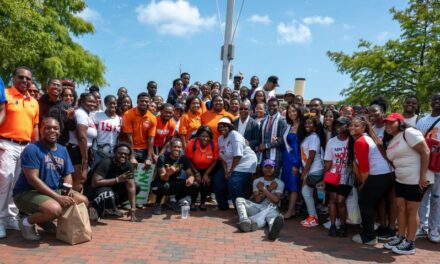
Attorney Ben Crump, center, holds Zayden Joseph, 6, the great-grandson of Henrietta Lacks, while standing with attorneys and other descendants of Lacks, whose cells have been used in medical research without her permission, outside the federal courthouse in Baltimore, Monday, Oct. 4, 2021. They announced during a news conference that Lacks’ estate is filing a lawsuit against Thermo Fisher Scientific for using Lacks’ cells, known as HeLa cells. (AP Photo/Steve Ruark)
By Deborah Bailey
Special to the AFRO
Nationally recognized trial attorney Ben Crump outlined his strategy in representing the Lacks Family in a lawsuit filed by the Henrietta Lacks Estate against Thermo Fisher Scientific, Inc. filed in US District Court in Baltimore, October 4.
In an exclusive interview with the AFRO this week, Crump explained it was time to stand up to decisions made by companies like Thermo Fisher Scientific, Inc. and the continuing racism endemic in the medical and pharmaceutical industries.
“They thought they could just sell her cells forever and her Black family would never be able to benefit from it,” Crump exclaimed. “To deprive her and her family of their dignity” he added.
Crump compared the unauthorized tissue removal from Henrietta Lacks’ body that occurred while she was being treated for cervical cancer at Johns Hopkins Hospital with chattel slavery, calling it “medical racism.” The tissue taken from Lacks’ body constituting the immortal HeLa cell line happened without her knowledge or permission.
The lawsuit seeks to hold Thermo Fisher Scientific accountable for unjust enrichment..
“When you look at a case of unjust enrichment it is about equity and fairness,” Crump said.
Crump is requesting the Court require Thermo Fisher Scientific to release “the full amount of its net profits obtained by commercializing the HeLa cell line” to the Lacks Estate. Crump is also seeking to forbid the company from using the HeLa cell line without permission of the Henrietta Lacks Estate.
“Do you know how offensive it sounds for a corporation to claim the right to the intellectual property of Henrietta Lacks Cells before the family,” said Crump?
“Everybody else in the world gets to profit to the tune of billions and billions of dollars and her family doesn’t get one cent,” Crump said, referencing the manifold pharmaceutical firms, research institutes and universities that have purchased, conducted research with and sold the coveted HeLa cells.
The lawsuit alleges the $30 billion biotechnology company is well aware that the HeLa Cells for sale on its website were taken from Lacks without her consent. “Thermo Fisher Scientific understands-indeed, acknowledges on its own website – that this genetic material was stolen from Ms. Lacks” according to the lawsuit.
“Thermo Fisher Scientific’s choice to continue selling HeLa Cells in spite of the cell lines’ origins and concrete harms it inflicts on the Lacks family can only be understood as a choice to embrace a legacy of racial injustice embedded in the US research and medical systems,” the suit continues.
According to the lawsuit, Thermo Fisher Scientific makes at least 12 product lines using HeLa cells. The AFRO checked the company’s website this week and found the cost of one vial of the ESRE-bla HeLa Cell line sells for $11,670.
University of Baltimore School of Law Professor of Law, Max Oppenheimer, patent attorney, biotech expert and specialist in intellectual property, agrees the civil complaint ”paints a troubling picture, raising both moral and legal issues,” but cautions that Crump and his legal team have several challenges ahead.
“The court is not being asked to determine morality in the broad sense; it is being asked to determine whether a specific party – Thermo Fisher – is liable,” Oppenheimer said. “The legal issues may turn out to be much harder than the moral issues,” he added.
Oppenheimer also raised a variety of technical thresholds that must be met for the case to move forward. “Assuming however that the Lacks Estate will prove all that is alleged, the case against Thermo Fisher still faces several hurdles,” he cautioned.
Crump said he understands the case is a first of its kind with respect to intellectual property rights. He is ready for the defense to offer a variety of arguments including the fact that the practice of informed consent was not used in medical malpractice until 1957, and not widely used in medical research before the 1970’s.
“This is an unprecedented case, but Henrietta Lacks is unprecedented,” Crump said.
Crump believes the case represents a “Case of First Impressions” meaning, one that lacks “controlling precedent” according to Cornell Law School’s Legal Information Institute.
“Never has it been more true than in this case,” Crump said.
“They are going to offer every intellectual justification they can. But they will all be intellectual justifications of discrimination,” Crump added.
“She was disrespected by the medical field and the question remains 70 years later, will she be disrespected by legal jurisprudence,” he concluded with a question.
Help us Continue to tell OUR Story and join the AFRO family as a member – subscribers are now members! Join here!
The post AFRO Exclusive: Attorney Ben Crump talks Henrietta Lacks injustice, current lawsuit appeared first on AFRO American Newspapers .











